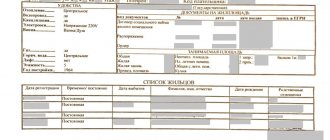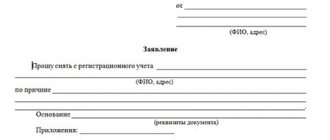Last modified: February 2021
It is not difficult to discharge yourself or to discharge one of the residents voluntarily and does not require going to court. A statement of claim for deregistration from an apartment is drawn up to carry out the procedure forcibly and the refusal of the resident to deregister on a voluntary basis or if his actual location is unknown. The court does not carry out the deregistration directly, but without a verdict rendered by it, the authorized bodies of the Ministry of Internal Affairs do not have the right to deregister.
Eviction under the housing code
In order to evict a non-owner through the court, a basis is necessary, since the law protects the rights of not only the owners, but also the people registered in the living space, who also have the authority to use the property.
The statement of claim for eviction and deregistration is drawn up in a strict form. Judicial practice proves that most often the requirements are not satisfied because the rules for forming the document were violated. It is noteworthy that only the owner of the property has the right to submit such an application.
The Housing Code states that a claim for eviction from an apartment of a registered person who is not the owner also implies forced eviction and moving out. The law is transparent, but going through all the authorities is much more difficult than stated in theory. Therefore, before registering a person on his square meters, the employer should think carefully.
Registration in non-residential premises is considered illegal only when it is proven that it is impossible to live on these meters.
In disputes, the status of the apartment is of great importance. The Housing Code voices the following points:
- If a citizen violates the rules for the use of real estate, then Article No. 35 comes into force.
- Art. No. 91 establishes the grounds for forced eviction.
- Art. No. 84 is working on the issue related to apartments in which a person lives under a social tenancy agreement.
- Clause 1 Art. 209 of the Civil Code of the Russian Federation says that there will be no extract if the citizen is a relative.
- Clause 1 Art. 31 of the Housing Code of the Russian Federation states that everyone who has registration is considered a member of the family of owners.
Note: when an individual violates the living conditions, it is easily possible to forcibly evict him if he correctly draws up an application and collects the necessary papers. With social rent, it is enough not to pay utilities for six months to lose your home. In this case, the municipality acts as the plaintiff and drafter of the petition.
Watch the video: “Removing a person from registration through the court.”
Petition part
An application to the court for an extract must contain a correctly drawn up petition part, otherwise delaying the process or other problems cannot be avoided. Typically, it is recommended to formalize a request to be discharged from an apartment in two points:
- Recognize Marina Alekseevna Ivanova as having lost the right to use the residential premises located at the specified address;
- Oblige the Department of the Ministry of Internal Affairs for St. Petersburg to remove Marina Alekseevna Ivanova from registration at the place of residence in the residential premises located at the specified address.
Legal grounds for eviction of a non-owner from a home
It is not enough to write an application to deregister a non-owner from an apartment through the court. This paper must indicate the legislative framework that will justify the plaintiff’s demands. In some cases, termination of residence and eviction is impossible without the provision of other living space.
In order to remove a person from permanent registration, the court must recognize the fact that there are compelling reasons for this procedure. Decree of the Government of the Russian Federation No. 713 provides detailed information about this process.
Causes
To discharge a person from an apartment through the court, you will need to draw up an action plan in advance. It is necessary not only to collect the necessary documentation and have a basis, but also to clearly understand where to go and what to indicate in the text.
Reasons for discharge may be the following:
- The citizen is officially declared missing.
- Death of the registered non-owner.
- Loss of right of residence.
- The registration was carried out in violation of legal norms.
- Sometimes passport office employees register people where they are not supposed to do so. Such registration is considered fictitious.
- The person does not live in the living space and there is evidence that he has another place to live.
- If people were married and then divorced, then the former spouse is not considered a relative and the owner of the property has the right to write him out. A compulsory procedure is provided if a person voluntarily does not want to deregister.
- You can even deregister a relative who has not lost the corresponding status, if he was registered before the privatization of square meters.
- For regular non-payment of utilities.
- Gross violation of the rules for using the premises and immoral actions. The rowdy will be discharged due to inappropriate behavior, as well as a threat to the life and health of household members.
Note: you need to file a claim only if you have a good reason. If a person simply did not pay for utility services, then he can ask for a deferment from the housing and communal services and retain his registration.
When you can't evict a non-owner
Mandatory elements of the claim
Some people can keep their registration and live in the room, even if the owner is against sharing household life. The state provides protection to certain individuals based on certain criteria.
Even a well-drafted claim will not help in deregistering citizens if they fall into the following category of the population:
- Owners of square meters in the form of shared ownership.
- Persons under eighteen years of age.
- Registered after privatization, including in case of refusal to enter into a share. In this case, the court will ask you to buy back the part. Additionally, a long deferment of payment is provided. During this time, a person has the right to occupy the apartment legally.
People with disabilities, dependents and those with serious health problems also fall under state protection. Under such circumstances, you should try to reach an agreement with the non-owner living in the apartment in pre-trial proceedings.
Consideration
Once a claim is received, it is reviewed by a judge for compliance with procedural norms:
- completeness of documents;
- payment of state duty;
- jurisdiction.
If all requirements are met, the application is accepted for consideration and a preliminary hearing is scheduled. On it, the judge prepares for the main trial: interviews the parties, determines the circumstances to be proven, and makes inquiries. Witnesses are interviewed at the request of the interested party. The number of meetings depends on how quickly evidence is collected.
Having received all the documents, the judge makes a decision. It is mandatory for all participants in the process and government bodies responsible for population registration. Housing offices and passport offices do not have this function; they act as an intermediary between citizens and the Ministry of Internal Affairs. In reality, registration at the place of residence or stay is handled by the department of the Ministry of Internal Affairs.
Knowing how to remove a non-owner from an apartment through the court, the legal owner will be able to fully protect his rights. To do this, you need to write a statement and justify your position, strengthening it with evidence. If you write a claim using the form and samples provided, supplement it with a detailed description of your situation, the court will need less time to make an informed decision.
Institutions for appeal
To start the process, you need to create:
Only actions in accordance with the established regulations will allow the office of the authority to accept an eviction request.
The main mistake that many applicants make is incorrectly indicating the name of the department. The Civil Code insists that the application must take place at the place of registration.
A statement of claim for the discharge of non-resident but registered citizens must also be filed at the residence address, even if the owner’s family is located elsewhere.
Note: it is not recommended to go to the first court you come across. Territorial affiliation must be respected - this is stated in Art. 24 and art. 28 Code of Civil Procedure. In megacities there are district courts, and in small settlements there are city courts.
Applications
The claim must be accompanied by a statement of claim according to the number of participants in the case and one copy for the court. Total 3: for the court, the defendant and a third party. Each of them requires a separate package of documents.
In addition to the application to the court for discharge from the apartment, documents confirming the position of the plaintiff are submitted. Various papers can serve as evidence. Most often, documents for the apartment are required confirming the authority of the owner. In the example under consideration, a certificate of divorce is attached to the claim.
A sample statement of claim for exclusion from an apartment can be downloaded here.
The procedure for evicting a non-owner from an apartment without consent through the court
The first step is to correctly fill out a sample application for discharge from an apartment through the court, if it was not possible to obtain consent for a peaceful settlement. An authority officer may require evidence that an attempt was made to reach an amicable agreement with the person.
The owner is obliged to try to resolve the issue in a conflict-free way, no matter who loses the right of registration and residence - a tenant, a family member or a distant relative.
There are many legal issues, so experts recommend acting in accordance with step-by-step instructions:
- Drawing up a claim with reference to the evidence base, excerpts from legislative norms that confirm the correctness of the position.
- Attracting evidence that it is not the owner who is violating the rules of residence if the situation is controversial.
- If a person is not savvy in law, it is better to contact a lawyer. If the claim is rejected, the issue of discharge and eviction will remain in limbo for a long time.
- If a former relative has objections, the court will take them into account and may change its decision, even when the law is on the plaintiff’s side.
- Non-owners can be evicted or evicted only after receiving a writ of execution. Before this, a preliminary hearing will take place, and then a verdict will be rendered.
- Collect a complete package of documentation, i.e. any papers related to the living space and the citizen who needs to be discharged and expelled.
- At the hearing, the state judge will ask questions. Clear answers should be prepared, since the final decision depends on them. If the plaintiff has nothing to say, and the defendant can prove the presence of financial problems and the lack of other space, then there is a risk of losing the case.
The procedure for discharge through the court
Before filing claims, it is recommended to analyze the categories of citizens who cannot be discharged from the premises. If the defendant falls under at least one of the points, then filing an application is pointless.
Stage No. 1: Drawing up a statement of claim for eviction of a non-owner from the property
A statement of claim for ejection from an apartment through a sample court may have different grounds, but the body is identical.
Filling nuances:
- The header indicates the name of the judicial authority and the city in which it is located.
- Full information about the plaintiff: Full name, address and contact information. Similar information about the defendant.
- The amount and check number are entered, which indicates that the state fee has been paid.
- After the header in the middle, the name of the document is written: “Statement of Claim for recognition of a citizen as having lost the right to use residential premises and deregistration.” Even if this phrase is written incorrectly, the office may leave the case without consideration or return it to correct the error.
- In the first line you need to indicate what its owner writes, as well as the number of the certificate for the property. It is enough for one person to submit an application, even if there are more owners.
- The body of the appeal states that the plaintiff carried out a pre-trial procedure, but it did not produce results. Confirmation can be a registered letter that was sent to the defendant and a notification of delivery.
- Further, regulations and laws are prescribed that confirm the right position of the applicant.
- After listing all the reasons, you should indicate a list of attached documentation, copies of which are attached. The judge will review the claim prior to trial and should have an idea of what documents the plaintiff is willing to provide and his overall position.
- At the end, put the date of completion and the signature of the applicant.
Stage No. 2: Collecting documentation for discharge through the court
If the owner does not live under temporary registration, then it is much easier to write him out, but documentation also needs to be prepared.
List of all documents without which the application will not be considered:
- Claim.
- Documentation proving the identity of the applicant.
- Certificates of title for housing.
- Information from the house register.
- Paid state duty.
- Papers confirming the grounds for deregistration of a non-owner.
Additional information may be required. For example, if a former spouse is being evicted, you must provide a certificate of divorce. It is also worth considering that if the defendant has nowhere to go, the court may give him a delay to find housing, and if he assures the authority that he is seriously ill, they will refuse to evict him altogether.
Stage No. 3: Payment of the state fee for eviction
The citizen must pay the costs of the government agency for considering his claim. The mandatory fee is 300 rubles according to paragraphs. 3 p. 1 art. 333.19 Tax Code of the Russian Federation. You can pay the fee through a terminal in the courthouse, Russian Post (a receipt for the state fee is requested from the department office) or a mobile bank card application.
Stage No. 4: Time frame for consideration of a claim for eviction of a non-owner
Conditions for removing a person from an apartment without his consent
After filing a claim, the judge will review the documentation within five working days. The petition is accepted for processing and you just have to wait for the summons for the preliminary hearing.
The hearing will take place no later than one month after the filing of the non-owner's eviction application. This is stated in paragraph 1 of Art. 154 Code of Civil Procedure. Subpoenas will be sent by mail with mandatory delivery.
Stage No. 5: Meeting
After filing the application, a preliminary hearing is scheduled. During the meeting, the circumstances of the case and the availability of the necessary list of documentation are clarified. Additionally, the judicial authority may request certificates from the housing and communal services or passport office. If everything is in order, then a date is set for the main hearing, where the decision will be announced. The process may be delayed due to the fact that the defendant does not come to the preliminary hearing.
Stage No. 6: Announcement of the verdict on the eviction claim
If the judge rules in favor of the plaintiff, he will inform that the forced deregistration of the non-owner has been approved. In addition, the time frame within which the defendant must complete the eviction procedure will be announced.
The application for discharge must be submitted to the passport office no later than the specified deadline. If this does not happen, then the plaintiff can turn to the bailiffs.
How to make an application to the court
A statement of claim for removal from an apartment must be made only in writing. It is submitted to the district court. It is determined according to the registration of the defendant – the person being evicted from the apartment. The place of residence is defined as the place of registration and when accepting a claim, the courts make inquiries, checking compliance with jurisdiction. In this case, if the owner of the premises has information about the actual place of residence of the defendant, he can indicate it. If it is unknown, then the claim should be filed in the court serving the area in which his apartment is located.
The nuances of eviction of a non-owner of the property
If all the conditions for filing a claim for eviction of a non-owner are not met, then its consideration may be refused. There are several rules and nuances that make the process difficult. Much depends on whether the property is owned or owned by the state. The list of features of registration from housing depends on the right of use.
From council housing
Public housing is owned by the local authority and it is they who will make the application. Despite this, it is not so easy to discharge a person from public housing. Most often, such citizens do not have any other real estate.
The court will make a positive decision on the eviction of a non-owner only in the following cases:
- A citizen has not paid for utilities for more than six months.
- Poses a danger to neighbors.
- Violates the rules of conduct.
- Uses square meters for other purposes.
- Doesn't keep the room clean.
Note: if a person has nowhere to go, then he will be given time to find another living space.
From privatized housing
Only the owner of the square meters or the shared owner can evict the premises that are owned. According to the law, the former spouse can also be discharged, since after the dissolution of the marriage he is no longer a member of the family. However, if a citizen falls into the category of those who cannot be deprived of housing by law, then the claim will be denied.
Eviction of a non-owner from an apartment registered under a gift agreement
There are also special cases when a person owns an apartment under a gift agreement. In fact, such a process is not much different from proceedings with privatized housing. After the conclusion of the deed of gift, the donee also receives a certificate of ownership from the government department and is its owner. This circumstance will not change the cost of the claim and the amount of the fee.
Check-out and eviction from a donated apartment
Statute of limitations for eviction
The statute of limitations applies to all proceedings. Casework cannot be opened if the period is more than three years. When the non-owner does not appear at the registered apartment for more than six months, then any court will make a decision on discharge even in his absence during the process.
The fact is that utility bills are calculated taking into account registered people and, naturally, the owner bears significant costs. The statute of limitations can always be restored if a person provides compelling reasons for this.
Legal grounds
Accommodation in an apartment or room is provided for various reasons. For example, directly by the owner in relation to his family members, by testamentary refusal, maintenance agreement with dependents, rental and other agreements and acts.
In some cases, the right of use is terminated: the owner changes, the family breaks up. Art. 35 of the Housing Code of the Russian Federation gives the owner of real estate the full right to evict a tenant from the occupied area who has lost the basis for occupying his square meters.
Legal consequences of deregistering a person without consent
Jurisdiction may be overturned. Owners do not always rightly try to expel a citizen from the premises in which he is registered. In this case, the person can file a counterclaim within ten days after the decision on discharge and placement is made or during court proceedings.
How to file an objection to an eviction claim
When drawing up an objection, you need to take into account the position of Article No. 131 of the Code of Civil Procedure of the Russian Federation. Such a document can be submitted by the defendant himself or the shared owner who does not agree with the eviction claim. However, this will be a separate application that requires separate collection of documentation.
The main thing is to present reasons proving disagreement.
Details about filling out the application:
- In the body of the message you don’t need just water, but write essentially. Support statements with legislation, facts, and certificates.
- The application can be submitted by a lawyer using a notarized power of attorney.
- A reference to Article No. 31 of the RF Housing Code and Art. No. 56 Code of Civil Procedure of Russia.
- Information about the claim to which the objection is being written, as well as the data of the parties, is written down.
- A list of the complete list of documentation provided is indicated.
Courts accept objections free of charge. There is no state duty for such actions. The papers are submitted exactly to the department where the paperwork is opened - they can be sent through the secretary or sent by registered mail by Russian Post.
Timing and cost
Deadline established by law:
- 5 days to accept the claim for consideration;
- 1 month. in some cases up to two, the court considers the case.
The state duty is 200 rubles.
The court considers the claim against only one defendant. If there are several defendants, then the application is submitted for each one separately. The fee is also paid for each claim.
In addition to the fee, you will also have to pay for the services of making copies of documents accompanying the application, and possibly notary services. Each region of the country has its own prices for them. Therefore, we will not be able to display the exact amount of expenses.
Judicial practice on eviction from the only home
Example: the owner tried to evict a distant relative from his apartment, but at the trial the girl brought a certificate stating that she was sick. The doctor’s report mentioned that the citizen needed an operation, after which she would become disabled. The court did not grant the petition to evict the non-owner.
The issuance of such a verdict forces the apartment owner to re-apply, but only when the operation is successful and disability is not granted.
Further actions
If events develop well, the court decides to discharge the person from the apartment. The court's decision must enter into legal force.
The law provides for a thirty-day period for this. However, this should not be the end.
Confirmation that the defendant no longer has anything to do with the residential premises will be the absence of a record about a specific person in the Form 9 certificate.
In order to achieve changes in this document, it is necessary to submit a court decision to the Federal Migration Service at the location of the apartment or house.
After completing all the necessary procedures related to notifying various authorities, you should contact the MFC. It is this organization that issues the above certificates.
As a rule, this document is ready for issue within a week. After which you can receive it and use it in the future for various legal actions.
To facilitate the plaintiff’s work, it is better to use the services of lawyers. This guarantees success.
Features of a claim for the discharge of a minor
In the statement of claim for termination of the minor’s right to use residential premises, indicate the child’s legal representative - one of the parents or guardian. If the child is 14 years old, he will take part in the trial along with his representative.
Attach to the claim as a basis documents on the transfer of ownership of the residential premises to another person or on the termination of family relations with the parent of a minor child registered in the residential premises.
A minor child cannot be deregistered if his legal representative is one of the homeowners. In this case, you will have to wait until he reaches adulthood.
In the statement of claim, indicate the requirement to evict the child to another living space. The application will be considered by the district court, as in a normal case.
After the end of the litigation, receive a writ of execution and, together with an application to initiate enforcement proceedings, submit it to the bailiff service.
State duty
The Tax Code of the Russian Federation establishes a rule according to which every person, when applying to the judicial authorities, is obliged to pay a certain tax fee. It may later be charged as legal costs and recovered from the losing party.
In 2021, the amount of state duty for property claims that are not subject to material assessment (eviction cases fall into this category) for individuals is 300 rubles, but if a representative of a legal entity goes to court, you will have to pay more - 6,000 rubles.
The claim template already contains all the necessary wording.
All you have to do is enter the last name, first name and patronymic of the defendant, as well as the exact address of the apartment from which the extract must be made.
And last but not least is the Appendix, which will list all the documents, copies of which you will attach to the statement of claim.
The total number of items in the Appendix is not regulated by law.
The statement of claim may contain 2-3 documents in its Appendix, or maybe 102 documents. It all depends on the amount of written evidence you can collect.
However, in any case, your statement of claim for eviction from the apartment must contain in its Appendix:
- original receipt for payment of state duty in the amount of 200 rubles,
- a copy of the statement of claim for the defendant with all the copies of the documents that you attach to the copy of the statement of claim submitted to the court.
What documents are needed to check out of a municipal apartment?
Typically, copies of the following are attached to the statement of claim for removal from a municipal apartment:
- a certificate of family composition (it is also sometimes called a certificate of composition of those registered in the apartment);
- an order for an apartment or a social tenancy agreement;
- personal account for the apartment;
- certificate of non-residence of the defendant in the apartment (if you can obtain it);
- other written documents confirming the conditions necessary for discharge from a municipal apartment.
So, the statement of claim for discharge from the municipal apartment is ready.
In the second part of the article, I will talk about how to draw up a statement of claim for discharge from a privatized apartment.
In the meantime, I’ll give you a strange recommendation.
Do not immediately run to court to file your claim for ejection from a municipal apartment.
Why am I making this recommendation?
Because I have handled more than one similar case and I know that by filing a statement of claim in court, you will prematurely reveal your intentions to the defendant. And he, probably, wanting to prevent expulsion from the apartment, will begin to collect evidence to refute the conditions that you will need to prove.
Premature filing of a claim, without preliminary pre-trial preparation for collecting evidence, can lead to defeat and complete loss of the opportunity to be discharged from the apartment.
You must understand that by demanding the defendant be discharged from the apartment, you are asking the court to overstep Article 40 of the Constitution of the Russian Federation, which guarantees every Russian the right to housing.
For the court to do this, you must have strong evidence that not only confirms the conditions under which a person can be discharged from the apartment (you can learn about all the conditions for discharge from the free mini-book), but also refutes the false arguments of the defendant.
Courts often refuse to vacate an apartment, because the defendant’s false explanations are not refuted by the plaintiff’s evidence, and the courts find no reason to ignore Article 40 of the Constitution of the Russian Federation.
You can obtain evidence that will not only confirm all 5 conditions for discharge from the apartment, but also refute the defendant’s false statements from the defendant himself.
Provided, of course, that he does not yet suspect your intention to remove him from the apartment.
To do this, you only need a mobile phone and/or social networks or email.
How to use these common things in the life of a modern person to collect evidence in order to drive your defendant “into a corner ” , I described in the video instructions: “How to discharge from a non-privatized apartment? part “Pre-trial preparation”.
Get a free consultation in 15 minutes
What's stopping you from winning the trial and being released from your apartment?
Dangerous illusions about the statement of claim, which consist of the following, prevent you from winning in court:
- a statement of claim to the court for removal from an apartment is mistakenly considered an insignificant document,
- a claim is a kind of formality that can be somehow drawn up, if only the court would accept it and begin consideration of the case,
- the most important thing is to start the legal process by filing a statement of claim, and then the court will sort it out.
The danger of such a misconception is that:
- an incorrectly prepared statement of claim for removal from an apartment may be returned by the court without consideration or left without progress. In such a situation, the trial simply will not begin.
- incorrectly formulated requirements in the statement of claim may lead to the denial of the claim.
I wish you a wonderful day and a life worth living.










